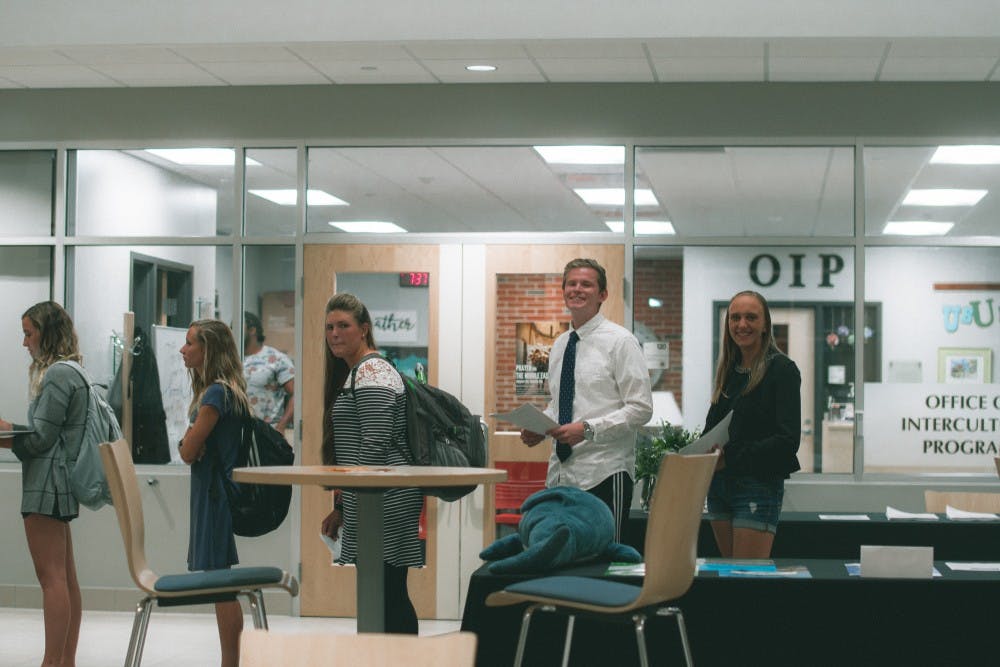By Abigail Roberts | Echo
This year, Taylor welcomed 26 international students from 18 nations, two Korean exchange students and zero new English as a Second Language (ESL) students.
Developed in 2009, Taylor's 4-year ESL program has had an average of eight students a year primarily from Korea and China, but also in the past from Japan, Spain, the Congo and Ecuador. Although small, the ESL program has had enough students to populate the classes. However, the number of students has been slowly declining since 2014.
Taylor also offers exchange programs for international students currently enrolled in universities abroad desiring to take college-level classes in the United States for one or two semesters. With an average of five students a semester, this program has also seen less student enrollment after the fall of 2016.
"I would not want to live in a world without language diversity," ESL program director Jack Peterson said. "ESL students bring with them an increase of knowledge, world experience and curiosity of the world through their different languages and that makes this campus a richer place."
The ESL program is not just for ESL students, but also for students and faculty within the Teaching English as a Second language department Kiplangat Cheruiyot Bii, director of Taylor World Outreach, pointed out.
"Without these students, it is a big loss," Kiplangat Cheruiyot Bii said.
After the transition of the admissions office's previous international recruitment officer, Dereck Kamwesa, in spring 2017, Yosef Teklewold was hired in Nov. 2017. His role is now split between applied science majors and international students.
In addition, there are few other people recruiting specifically for the ESL and Exchange programs broadly. Chin Chang, department chair of modern language and professor of Spanish has worked with Handong Global University and Hallym University to recruit alongside Charlie Brainer, associate dean of international programs and Asian Initiative.
Taylor also has a partnership with the Japanese Bible Society which has sent two students in the last three years, sophomore Maki Ohashi and Hiroki Kuroda.
"No one has, as their load, recruiting internationally," Peterson said. "I think we have seen the effects of not having a recruitment plan that can ride the waves . . . Taylor needs to examine its priorities and see if it is something they value enough to recruit for."
Juniors Stephanie Mithika and Jamal Strachan were both visited by a Taylor international recruitment officer while in high school.
"I think it's important that someone like Dereck came to visit my high school," said Mithika. "As a foreign, international student, I was rather hesitant about picking a school that I had never heard of . . . in the cornfields of Indiana! Dereck gave me more context for Taylor . . . (which) I would have written off solely because of the location."
Strachan agrees that when coming to another country for university it is helpful for someone of a similar culture to yours to share what the transition and new culture will be like.
According to Nate Chu, assistant director of admissions, the admissions office is striving toward betterment, if that means international students are more cared for, even if that is reflected in the numbers, that is still better.
"We are not where we need to be or where we want to be," Chu said. "But we have come a long way even since my time as a student. We don't want to set a target number (of international students) because then the number becomes the goal . . . It is not about being a statistic here at Taylor, but each student's growth."
For the last two years, the admissions office has hosted 15 Korean students on average, from Korean Wells High school, for Taylor's CRAM summer program.
Freshman, Deok Jun Lee, the first Korean Wells High School graduate to attend Taylor expressed how important it is for him to share Korean culture with the Taylor campus.
"There is so much history and information about the world that people need to know and see," Lee said.
Debby Cheruiyot Bii, director of International Student Programs, believes having both international students and missionary kids provides the opportunity to open doors for what the Lord has planned for fellow students and expands student's worldview.
"If we don't have those numbers we are shortchanging US students coming to Taylor," said Debby Cheruiyot Bii.
Mithika stated that investing in international recruitment prioritizes making our community a space where we can practice new ways of seeing, listening, thinking and living, that we only gain from truly, intentionally diverse communities.
Chu shared that the admissions office is always thinking of how do we recruit a well-rounded class to be a better representation of the body of Christ.
"A Christ-centered community reflects every nation, every tribe, every tongue," said Strachan.
Peterson believes that if Taylor is making any claims on being an international campus they need to not only focus on training those from Indiana. And if its stated mission is to "develop servant leaders marked with a passion to minister Christ's redemptive love and truth to a world in need," the campus should echo those claims.
If this is Taylor's desired narrative, the community should reflect it.





